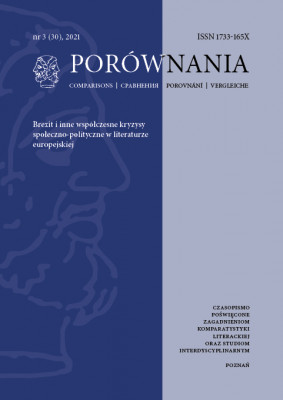The Crooked Mirrors of the Crisis? Brexit-Related Socio-Political Conflicts and Divisions in Contemporary British and Irish Fiction
The aim of this article is to offer a literary, philosophical and socio-political background to the development of BrexLit, defined by Jon Day (in 2017) as an emerging genre of literature. Our article’s focus is on British and Irish novels, as well as other anglophone fiction from outside the British Isles, which communicate a message to do with the 2016 referendum resulting in the departure of the United Kingdom from the European Union. Novelists have developed a particularly acute and sensitive response to the socio-political transformations in Great Britain and, to a large extent, in Northern Ireland. The key question we address here concerns the role of literary discourse confronting socio-political realities and various ideologies that have affected people living in the UK. Do the novels published over the last few years reflect alternative political scenarios? Or, by involving an inevitable temporal slippage in commenting on European realities, are they only a displaced and ideologically refracted reflection of the social changes, i.e., crooked mirrors of the crisis? Is there, in the contemporary novel, a still inadequately utilized potential to shape and implement fictional narratives with a view to a better future of the culture—and the whole public sphere—in the British Isles? Our answers consist in maintaining close ties between the evolution of the British assessment of sociopolitical realities and European culture at large, including the sort of culture that is only anticipated and projected onto the future. Both British and Irish writers who address Brexit as an issue nearly unanimously emphasize a message about upholding and affirming a supranational community above politics, even in the face of recent rifts and divisions.
| Article Title | Type | Size |
|---|---|---|
| 02 Bartnik Drong Zduniak Wiktorowicz | [pdf] | [163 KB] |
